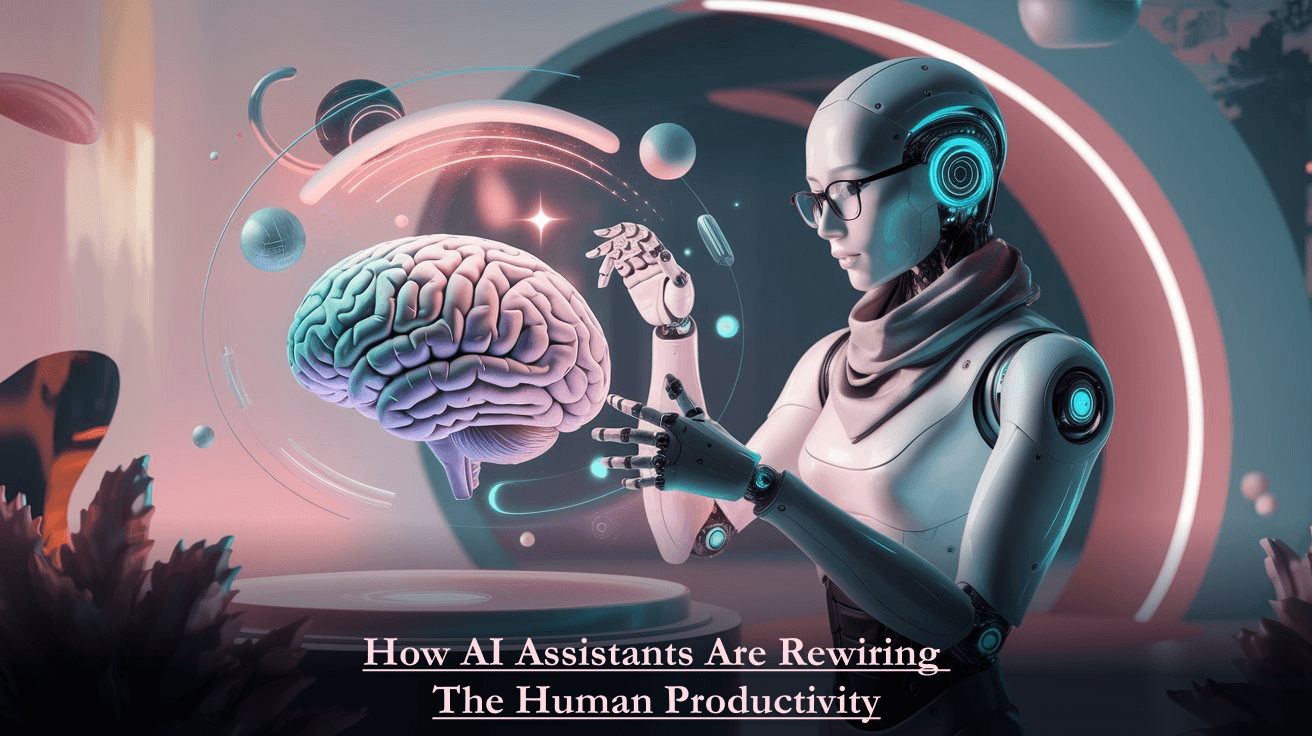Oct 21, 2024
How AI Assistants Are Rewiring the Future of Human Productivity
We stand at the threshold of one of humanity's most profound shifts in productivity since the Industrial Revolution - the era of AI assistants. These digital entities are much like ChatGPT, powered by the same foundational technologies. They are silently restructuring the corporate landscape with a promise to inject $4.4 trillion annually into the global economy by 2025.
"We are seeing the biggest spike in human productivity since the discovery of the personal computer," says Dr. Sarah Chen, AI Research Director at the Stanford Digital Economy Lab. "But unlike previous revolutions, which merely augmented our physical capabilities, AI assistants are expanding our cognitive bandwidth in ways we're only just starting to understand."
Consider this: The average knowledge worker spends 28 percent of his or her workweek managing email and 19 percent gathering internal information - nearly half of their productive hours are lost to tasks that today's AI assistants can handle in seconds. Companies like FastTrackr AI, with its WhatsApp-native executive assistant, are already moving beyond simple automation to intelligent collaboration that feels remarkably human.
Welcome to the age of cognitive automation, where the question is no longer if AI will change the nature of your work, but whether you'll be one of the early adopters who gets a front-row seat on this ride.
The Great Convergence: Understanding the AI Assistant Paradigm
What we commonly refer to as "AI assistants" goes far beyond a simple digital assistant. Instead, it represents an inflection point of several significant technological advancements: natural language processing that approaches the level of human comprehension, machine learning systems that improve with each use, and cognitive architectures that functionally approach near-human intuition to grasp context.
Beyond the Binary: The New Intelligence
Traditional software works in binary - yes or no, if this, then that. AI assistants, however, operate in spectrums of understanding, much like the human mind.
They don't just process; they interpret. They don't just respond; they anticipate. This fundamental shift from binary to spectral intelligence marks a new milestone in human-computer interaction.
The Anatomy of Intelligence: How AI Assistants Really Work
Imagine an AI assistant as an orchestra of technologies working together:
The Language Core
Natural Language Processing is the linguistic cortex, enabling the AI to understand and reproduce human language to a near-perfect degree.
Semantic understanding networks capture meaning across contexts, allowing AI to reconcile subtleties and nuances - crucial elements for effective communication.
Emotional intelligence modules decode human cues in subtle ways, allowing the AI to respond not only appropriately but empathetically, enhancing user experience.
The Learning Engine
Adaptive algorithms evolve with each interaction, so the more one uses the AI, the more effective it becomes over time, adjusting responses and actions to users' preferences.
Pattern recognition programs identify user preferences through past behaviors and decisions, creating a highly personalized experience.
Behavioral prediction models anticipate needs in advance, proactively supplying solutions and suggestions based on user goals and behavior.
The Memory Matrix
Contextual databases maintain coherence in conversations, making interactions feel cohesive rather than disjointed.
Experience banks learn from collective user experiences, providing a robust foundation to improve overall performance and responsiveness.
Personal preference archives facilitate deep personalization, allowing the AI to learn and act in accordance with individual user preferences over time.
The Productivity Paradigm Shift
For the first time in human history, we have tools that do not merely augment our abilities but understand our intent. In the enterprise context, this transformation is beautifully exemplified by FastTrackr AI - an AI system that has revamped the traditional role of the executive assistant through a WhatsApp interface. No, it's not mere automation; it's augmented intelligence at your fingertips.
The Three Laws of AI Productivity
The Law of Cognitive Offloading
Any work that is automated frees up brainpower for higher-level thinking, allowing a shift from mundane routine activities to strategic efforts.
Sophisticated choices become clearer, creating a fact-based understanding that informs decisions intelligently.
Creative opportunities flourish when routine tasks disappear, directing professional energy toward innovative projects and initiatives.
The Law of Exponential Return
The more the system engages with the user, the more it learns to improve itself in an endless loop.
Personalization develops over time, making AI an integral part of workflows.
Value multiplies over time, yielding increasingly impressive returns as the AI becomes better at fulfilling user needs.
The Law of Contextual Awareness
AI assistants learn the organizational context, understanding the unique dynamics and workflows of a business environment.
They adapt to varying working styles, providing just-in-time support that fosters creativity and efficiency.
They conduct need-based forecasts using patterns that allow for proactive engagement, keeping projects on track and stakeholders informed.
The New World Order
Revolution in Healthcare
The transformation in healthcare is no longer merely about scheduling appointments; it's about creating an intelligent layer that connects every aspect of patient care:
Predictive health monitoring relies on data analysis to anticipate imminent health issues, enabling disease prevention or early intervention.
Integrated care coordination facilitates communication between providers, patients, and families, promoting comprehensive treatment approaches.
Real-time medical data analysis equips professionals with current patient information, providing a solid foundation for informed decisions.
Personalized treatment tracking offers patients a tailored health journey, optimizing therapies and interventions based on individual needs.
Financial Evolution
AI assistants are becoming the new bedrock of financial intelligence in modern banking and finance. Some applications include:
Proactive fraud prevention utilizes complex algorithms to detect suspicious activities in real-time.
Personalized wealth management leverages AI to analyze individual financial goals, offering tailored investment strategies and advice.
Real-time market analysis enables investors to seize market opportunities promptly with quick decisions.
Behavioral economics integration allows financial institutions to gain insights into consumer behavior, improving product offerings and customer experiences.
Educational Renaissance
Learning is transforming from standardized approaches to personalized experiences, changing how curricula are streamed in real-time to meet the individual needs of each student, fostering deeper understanding:
Real-time monitoring of student comprehension tracks progress and identifies challenges, enabling timely support.
Personalized curricula are structured to cater to each student's learning experience, taking into account their strengths and interests for better retention.
Interactive knowledge exploration encourages hands-on discovery through AI-powered platforms, enabling deeper inquiry and exploration.
FastTrackr AI: The Best AI Executive Assistant
FastTrackr AI is one of many AI assistants destined to grow as vision meets execution. Operating through WhatsApp - an app people already use - it eliminates much of the friction associated with new technology adoption. Consider its core innovations:
Seamless Integration
No new apps are needed, reducing barriers to entry for both users and organizations.
Fits seamlessly into existing communication flows, minimizing disruption to established workflows.
A zero learning curve allows users to leverage its capabilities immediately, boosting productivity from day one.
Intelligent Automation
Email drafting incorporates context awareness, enabling quicker and more relevant communications that align with ongoing discussions and projects.
Calendar management with intelligent prioritization ensures that all major activities and meetings are emphasized, avoiding scheduling conflicts and enhancing efficiency.
Voice-to-text conversion with semantic understanding increases accessibility and convenience for hands-free interaction with the AI.
Resource Optimization
90% cost savings compared to human executive assistants highlight the economic benefits of AI assistants in enterprise environments.
33% time savings on mundane activities translate into significant resource utilization and strategic planning opportunities for teams.
Real-time ROI showcases tangible savings for organizations when integrating AI.
The Ethics Frontier: The Future
As we move further into this new frontier, we need to address vital questions:
Privacy in the Age of AI
Data sovereignty in an interconnected world emphasizes the importance of knowing how, where, and in what manner data is collected and controlled.
Digital privacy remains a fundamental right, ensuring that user information is not misused.
Ethical use and storage of data are essential for building and maintaining trust in AI technologies and fostering responsible innovation.
The Question of Consciousness
Limits on understanding consciousness create confusion about our perceptions of intelligence and the capabilities of machines.
The nature of machine intelligence encourages discussions about what thinking and learning might mean in the digital world.
Future human-AI collaboration poses the question of how we can use these technologies to enhance and support human skills and judgment rather than replace them.
The Road Ahead: Tomorrow's Horizon
The future of AI assistants will no longer revolve around better algorithms or faster processing; it will focus on creating a new partnership that harmonizes human and machine intelligence. We are moving toward systems that not only assist but collaborate, understand rather than merely process, and respond instead of react.
Emerging Frontiers
Emotional Intelligence Integration will allow AI to better comprehend and respond to human emotions, fostering deeper connections.
Cross-Cultural Understanding will enable AI to navigate the nuances of diverse working cultures and global interactions.
Predictive Task Management will provide users with insights into future priorities, ensuring timely action on required tasks.
Autonomous Decision Support will offer actionable insights and informed recommendations for quicker decision-making.
The New Awakening
We stand at the precipice of a new era in human productivity. AI assistants represent not just a technological step forward, but a philosophical shift: it's not merely about work and thought, but how work and thought get done.
Solutions like FastTrackr AI demonstrate that the future of productivity is to augment, not replace, human intelligence in ways we are only beginning to comprehend.




